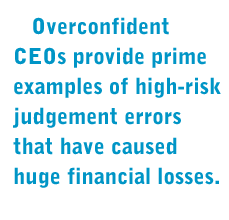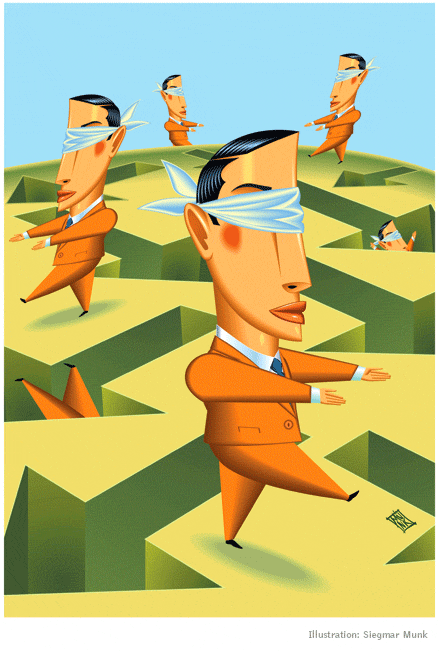


by Judy Purdy
Intro/ Paradoxical Betting
| Overconfident Narcissists
| Gamblers' Illusions

![]()

Intro
To make a decision — any decision — requires a certain amount of confidence in our understanding of the risks and benefits. But overconfidence, and the illusion of control, can add up to bad decisions and big losses, according to UGA psychology professor Adam Goodie. “Confidence is your subjective probability of getting it right,” he said, “and most people are overconfident most of the time.”Goodie is among a growing number of psychologists whose research challenges a centuries-old cornerstone of decision theory — that the “expected value” of an uncertain prospect is simply an objective function of arithmetic. He and his colleagues believe that this straightforward calculation, based on the probability of each possible outcome and the magnitude of its gain or loss, is valid as far as it goes. But it leaves out people’s subjective nature. “I tackle the issue of whether the whole field has missed a basic component of decision making,” Goodie said. “People’s approach to risk changes when they are betting on something they think they can control.”
Paradoxical Betting
Volunteers in Goodie’s experiments display the greatest willingness to bet when their confidence is highest, even if their actual long-term odds of winning are least favorable. But when their confidence is low they avoid risk, rejecting bets — including favorable bets — more often. These findings, true for people with normal personality traits, are exaggerated among problem gamblers and individuals at the high end of normal narcissism, or self-aggrandizement. Goodie has coined the phrase “paradoxical betting” to describe such behavior.
Paradoxical betting may help explain why people’s behaviors often don’t square with the facts. Take, for example, a preference to drive rather than fly, even though the record confirms that flying is significantly safer. Or consider the decision to start a new business, despite statistics from the U.S. Census Bureau that 50 percent of new ventures close within the first four years.
At the heart of Goodie’s research is the notion that people can improve their decisions and more favorably influence outcomes by acquiring information, assessing their confidence and developing what they believe is a realistic sense of control. But when a person’s perceived level of confidence is in conflict with his or her actual degree of control, results can be dreadful.
Goodie’s conclusions are based on experiments involving many hundreds of college students. These volunteers take trivia tests, having first estimated their confidence to supply correct answers. (The seven levels of confidence range from 50 percent to 52 percent up to 98 percent to 100 percent.) A typical trivia question might be “Which state has a larger population: New York or Wyoming?” While not all trivia questions are so easy, they do generally induce overconfidence, Goodie said. (See sidebar on page 27 for sample trivia questions and the assessing of narcissism and gambling.)
During a test, essentially a “bet,” correct answers earn points while wrong ones cost points. Unlike casino bets, Goodie’s bets are fair — favoring neither the “house” nor the player — as long as players’ confidence levels match their record of supplying correct answers. However, bets are favorably weighted toward players whose accuracy exceeds confidence levels, and bets favor the house when players are overconfident.
For example, if you assess your confidence at 99 percent, then a correct answer — in the sample question above, that New York is more populous — earns you 100 points, but if you pick Wyoming, you lose 9,900 points. That’s because out of 100 questions you would win 100 points 99 times and lose 9,900 points once; in other words, if your confidence assessment is correct and the bet is fair, you break even.
But if you answer such questions correctly only 95 percent of the time — that is, if you were overconfident — then you would win 100 points 95 times and lose 9,900 points 5 times. Your net loss would be 40,000 points [(95 x 100) – (5 x 9,900) = 40,000].
Over the course of Goodie’s hour-long experiments, therefore, overconfidence usually leads to substantial losses. While the average volunteer loses 30,000 points, some have lost 100,000 to 200,000. For narcissists and problem gamblers, the losses can be far greater.
“I didn’t think people’s overconfidence, combined with their risk taking, would lead to such disastrous outcomes,” said Goodie, whose findings were published in the July 2003 issue of the Journal of Experimental Psychology: Learning, Memory and Cognition.
“People are overwhelmingly willing to bet at confidence levels of 99 percent. The problem is they may be only 95 percent accurate,” he said. “They risk losing enormous amounts more often than they can justify.”
Intro/ Paradoxical Betting
| Overconfident Narcissists
| Gamblers' Illusions
For comments or for information please e-mail the editor: jbp@ovpr.uga.edu
To contact the webmaster please email: ovprweb@uga.edu
![]()